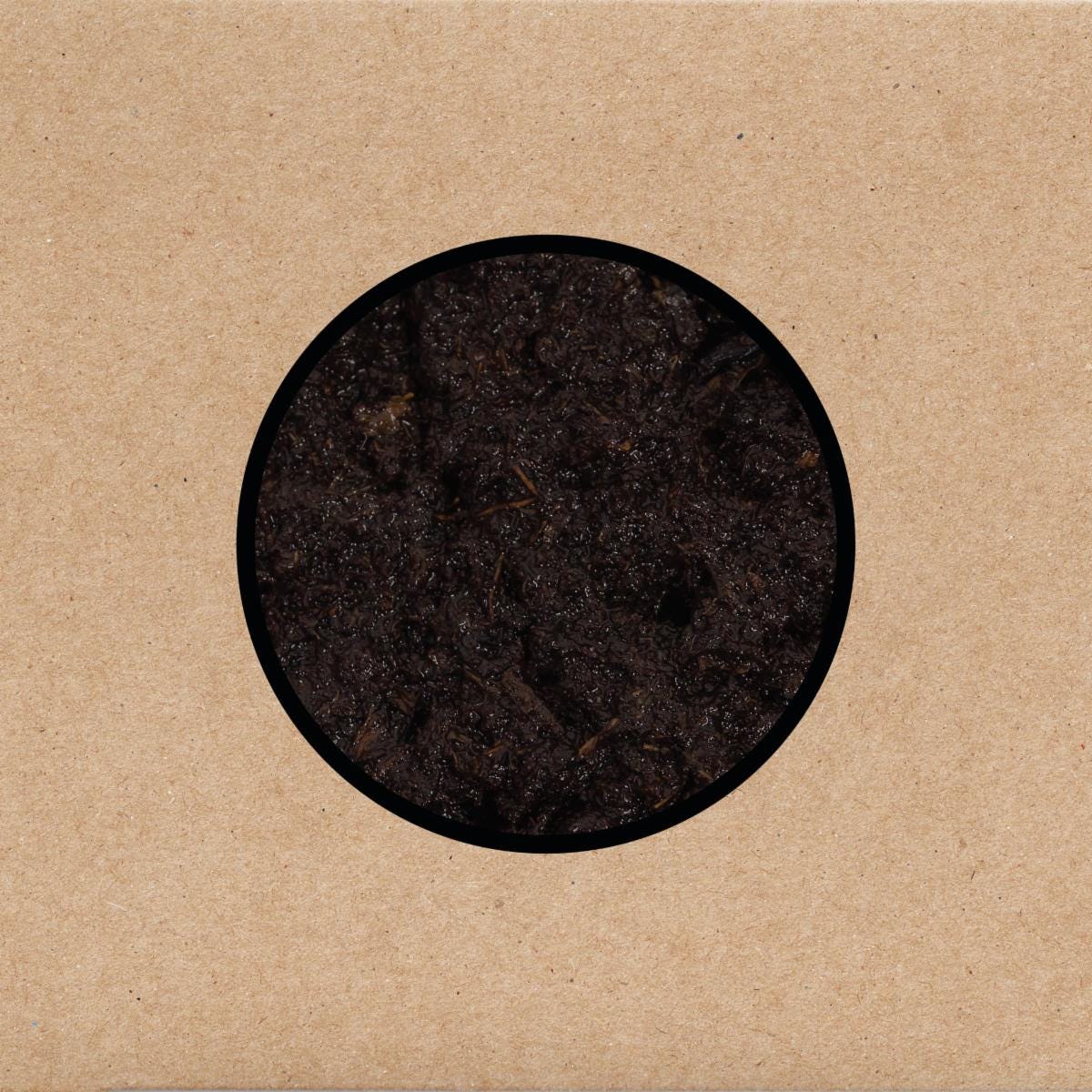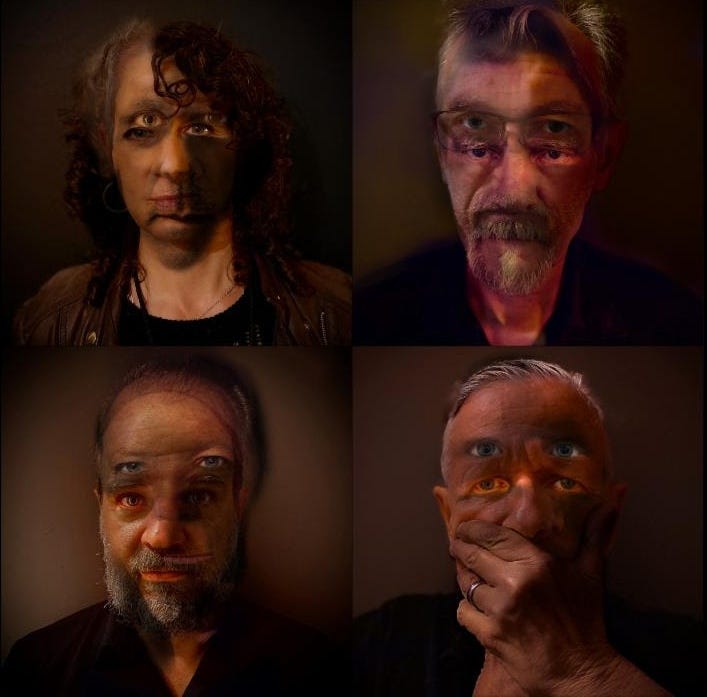Swans: Birthing
Young God Records / Mute
LP | CD | DL
5/5
Swans release their 17th album (and final LP in this incarnation), Birthing. A monolithic, crushing behemoth of a farewell disc. Sean Millard feels his soul pancaked beneath the gravitas of what might be their finest release since The Reformation. Look upon this work, ye mighty, and despair!
A new Swans LP is always cause for an anticipatory adrenaline surge followed by uncontrollable celebration. I’m proudly one of the hardcore who happily pays through the nose for an Executive Production credit as part of Michael Gira’s now-customary and unique crowd-funding program that raises independent funds for every new release. I love Swans and have done since I first heard an acoustic version of “Trust Me” from Children of God on a freebie Melody Maker cassette in 1989. It was given away to promote some of the bands on a (fantastic) Reading Festival bill a couple of years later. A profound moment. I was struck immediately by Gira’s immense baritone, the glacial pace of the song itself and its bleak and lyrical despair. I was immediately in love and have been ever since.
That album, Children of God, is 70 minutes long. Almost every Swans studio LP since then has near equaled or exceeded that run-time. It’s safe to say that incessance, overkill and endurance are all glorious elements of Swans commanding shtick. They’re not a concise pop band. Although their one foray into major label “commercialism”, 1989’s The Burning World, remains one of my favourite releases by them, despite its divisive reputation for both the band and its following. That was a shorter one. All of which is a long way of saying that Birthing’s near-two-hour, triple LP runtime is not a Swans anomaly.
It’s huge. Intimidating. Just seven songs span the duration. To add ice and a slice of demand to proceedings, Swans are not a band you can just simply dip into for five minutes via a single song or snatched moment. They’re old-school. They are a wonderful investment, insisting on your attention and designed for focus. For becoming overwhelmed by the power, the repetition, the mantra, the ritual. Swans are all or nothing. They want to exhaust you in every way. They want you to spend time with them. It’s what makes them special, and it is definitely a contributing factor to the immediate kinship that is felt between members of their dedicated fan-base. Swans are a lifestyle, a genre, an immaculate Pillar of Salt. A cult. You are an acolyte. A child of god.
Swans initial run ended, barring some live work and a compilation, in 1996 with Soundtracks For The Blind. Gira side-stepped from there into the folk-tinged beauty of Angels of Light before introducing a new concept for Swans in 2010. Since then, they have continually released amazing, massive records and have accumulated an ever-more dedicated congregation along the way. Surprising, really, because the work delivered from this second incarnation is, to my mind, some of the most uncompromising and dense music the band has ever created. It’s deliberately a challenge. And live, as ever, even more so. Entirely overwhelming. In the best possible way.
Birthing is the seventh and final album of this era of Swans. Gira has explored the all-consuming sound worlds and intense meditations enough. He tantalises us by saying of the future: “Swans will continue, so long as I’m able, but in a significantly pared down form. Hints of that direction can be found in a few moments (on Birthing). In the meantime, my hope is that the music provides a positive and fertile atmosphere in which to dream”. How enticing.
The album begins with The Healers; a gentle, lulling introduction. Coming in almost straight away with Gira’s god-like statement: “I am the Mother of our daughter. My wings are spread out across the sky…”. It introduces the punishing Old Testament visions that are present throughout Birthing. Dream-states, drowning and elevated bliss are key themes, all coagulating in a very real sense of a farewell that infiltrates every inch of the record’s grooves. It is clear that this is goodbye. The Healers is a sorrowful exploration of deicide (not the band, though that would be fun), lost hope and prayer, momentarily dissolving into complete chaos before we exit, with Gira screaming his disappointment and disgust at whatever god-like entity has deserted him and who is therefore in his sights. Equally, he could be raging at the mirror, with self-loathing at his bloated sense of self-importance. It’s a beautiful, human, thing.
The well-received preview track, I Am A Tower, is next, and it’s the closest Birthing comes to anthemic rock; at least, for the final Heroes-inspired crescendo. It’s a song that I can imagine taking an edited-down form in the future to provide a linchpin to a calmer, more song-oriented new incarnation’s set-list. Its jubilant climb and pay-off are a master-class in patient songwriting and structural intensity.
Birthing, itself, begins with tinkling bells and pads, before Norman Westberg’s saturated guitar starts hinting at a riff, but instead climbs beyond, into a sprawling, sedate and harmonious improvised-sounding lead line. It soon develops into open chords, and with a crash, Phil Puleo’s drums are dramatically punctuating the slow growth of the song’s long intro. That “Heroes” influenced, e-bowing tonality, is a motif – even if only as an undercurrent – that seems to weave its way through the entire LP. It occasionally rises into the foreground to give the listener a sense of obscure familiarity. Then it dissolves into the background, lost once more. It’s a really cool aspect of the album. It provides a subconscious continuity to the songs and glues the album together without boisterously sucking up the limelight. It’s just one of Birthing’s multitude of different layers.
I assume it’s intentional; Gira is too deliberate in his direction for it not to be. It makes sense and adds further weight to the long goodbye of the album. Especially if you bear in mind Heroes’ sentiments: “We’re nothing, and nothing will help us; maybe we’re lying, then you’d better not stay, but we could be safer, just for one day…” That diametric sense of power and powerlessness, scale, futility and victory… the end of an era, the end of the world. One day left to rise in. That muddle of humanity that makes Heroes so compelling infuses so many elements of Birthing’s ethos. Or at least, so it seems.
Red Yellow starts like some kind of weird Tim Burton show tune, performed by wide-eyed, leather-skinned goblins, high-kicking from atop stalagmite pedestals, deep within the terrifying damp darkness of this hollow earth. It’s genuinely haunting and weird. Eventually it breaks into a more consistent rhythm and Gira takes control with the vocal bellow we’re more accustomed to, rather than the unsettling toothless Gollum-like whispers that dominate the first half of the track.
Guardian Spirit is the second song on the fourth side of this magnum opus. It’s the track that sounds the closest to the band’s more recent material. Oddly, for that reason, it’s perhaps the least magnetic expedition on the album. Which is more of a statement regarding the power of the rest of the record than it is anything remotely negative about the song itself. Guardian Spirit would have sat happily among the songs on Leaving Meaning or The Glowing Man, for example. It relays an intense wall of brutal and magnificent repetition that swiftly transcends your consciousness into a different state; a higher plane, through hypnosis, claustrophobia and bludgeoning incantation.
The Merge has a sound collage motif that hearkens back to the farewell album of the first incarnation, Soundtracks For The Blind. Digital and acoustic noises merge (ahem) and move around one another. They are occasionally interspersed with a child’s voice counting to ten in both German and English. It’s moderately disturbing. The Merge’s second movement recalls ritualistic vocal drones; faceless, cloaked monks, slowly marching in crocodile formation through a dimly lit gothic basilica. Before calming to Gira’s voice, just accompanied by murmuring strings: “And I will wander in a lake underwater, where the jewels drift by me forever, where their minds combine and silence is laughter… where waking is dreaming, where motion is stillness, while I drift in the tides, in wonder, going under”.
The sombre ambience is broken momentarily with an out of context “oom-pah” vocalisation. And it’s gone. There’s something doubly rewarding about the short, sweet climax, because it took such a meandering and abstract path to get there. It’s a magical, subdued crescendo. I can only hope that this is the type of thing Gira is alluding to for the next version of Swans.
Birthing is Swans’ most powerful record since reforming. It’s the perfect blend of so many elements of their sound; the collages, the drones, the endurance, musicality and elegiac lyricism. Despite the apparent inaccessibility of the song lengths, the repetition, unconventional instrumentation and the avant-garde structures, it’s easily the most approachable record they’ve released since the 90s. It’s a true masterwork. It is art. Their definitive statement. And there’s no better way to say goodbye. I understand completely. You couldn’t follow Birthing with anything remotely tackling similar musical territory. It is an ending. A full stop. In everything it does and everything it says. The ultimate anthem and a perfect summation of Swans career, life and presence. And now, their death. For the moment.
Interestingly, the final song, (Rope) Away feels like its name deliberately nods a fond farewell to this era by referencing the title of the first album of The Reformation, My Father Will Guide Me Up A Rope To The Sky. Erstwhile Swan, Norman Westberg, shines on it. His playing is present on virtually every Swans LP. He is as iconic to the band’s visage as Gira Himself. His solo work consists of ambient guitar drones, which are meditative themselves, and there’s a strong essence of this in (Rope) Away.
Beautifully orchestrated, we’re twelve minutes in before drums start pounding behind the hypnotic strings. Fifteen minutes have passed before act three begins, with sampled choral stabs and acoustic guitars. Even some sort of flute(!) backs Gira’s sensitive vocals: “I’ll stir the stars to feed your eyes; we’ll drift away in dreams tonight. Away, away, away, away. Away, away, away and gone”.
What an ending to an epic adventure.
‘Nuff said.
All words by Sean Millard






Thanks Eugene!